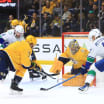The Philadelphia Flyers managed to deal with adversity all season, but their final task was too much to overcome.
The Flyers made the Stanley Cup Playoffs despite a 10-game losing streak (0-5-5) from Nov. 11-Dec. 2, winning their final two games of the regular season to clinch a postseason berth. They fell behind 3-1 in the Eastern Conference First Round against the Pittsburgh Penguins before winning 4-2 in Game 5 to force Game 6, which they lost 8-5 on Sunday.
Flyers hurt by key injuries in first-round loss to Penguins
Couturier, Provorov at less than full strength, special-teams struggles costly

© Len Redkoles/Getty Images

















